The controversial "six strikes" anti-piracy system is scheduled to go into effect in the US within the next few weeks. Five major Internet service providers will initially be participating including Verizon, whose policy on the system was recently obtained by the gang at TorrentFreak.
According to the document, a Verizon customer that is caught sharing copyrighted material via BitTorrent will first receive two notifications. These alerts will be delivered by email and automatic voice mail to the contact information on file. Verizon will additionally provide a link to information on how to check and see if file sharing software is installed on your computer, how to go about removing it if it is installed and where you can obtain content legally.
Strikes three and four will redirect users to a website that forces them to acknowledge they received the first alerts. Furthermore, those accused of file sharing for the third and fourth time will be required to watch a video about copyright law and the consequences of copyright infringement. Clicking the acknowledgement button isn't an admission of guilt but simply lets the ISP know that you have received the alert.
The fifth and sixth strike will redirect the user to a webpage where they are given multiple options to choose from. Users can agree to an immediate temporary reduction in Internet speed to 256Kbps (hardly any faster than dial-up) for about two to three days, agree to the same speed reduction but delay it for a period of 14 days or ask for a review of the validity of the alerts by the American Arbitration Association.
It's worth pointing out that if further infringements are discovered after the sixth violation, nothing more will happen. Connection speeds won't be throttled and users will not receive any more alerts. What could happen, however, is that the MPAA and RIAA could obtain your IP address to take legal action if they so desire.
Interestingly enough, these measures will also apply to business customers which could have a negative impact on the availability of free public Wi-Fi.
